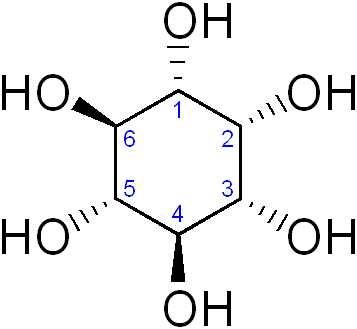Last Updated: 13 September 2022

Figure 1. The chemical structure of Inositol (Vitamin B8).
Inositol (or myo-inositol) is a carbocyclic sugar that is abundant in the brain and other mammalian tissues. Inositol mediates cell signal transduction in response to a variety of hormones, neurotransmitters, and growth factors and plays a role in osmoregulation (i.e. regulation of osmotic pressure). Inositol is made naturally in the human body from glucose. Inositol is also known as Vitamin B8; however, it is important to note that Inositol is a type of sugar and not a true vitamin.
Inositol plays a structural role in your body as a major component of cell membranes. It also influences the action of insulin, a hormone essential for blood sugar control. In addition, Inositol affects chemical messengers in your brain, such as serotonin and dopamine.
Inositol is found naturally in cantaloupe, citrus fruits, and many fiber-rich foods such as beans, brown rice, corn, sesame seeds, and wheat bran.
As a dietary supplement, Inositol is commonly promoted to help with lowering the risk of metabolic syndrome (a risk factor for a number of conditions including increased belly fat, high blood pressure, and high blood sugar), lowering high cholesterol, regulating and processing insulin, relieving anxiety and symptoms of panic disorder, reducing the risk of gestational diabetes, relieving symptoms of depression, and relieving symptoms of polycystic ovary syndrome.
Sources and Citations:
* Please be advised: always seek medical consultation if you require medical help or attention. The contents of this Codex are for educational purposes and are not intended to offer personal medical advice.